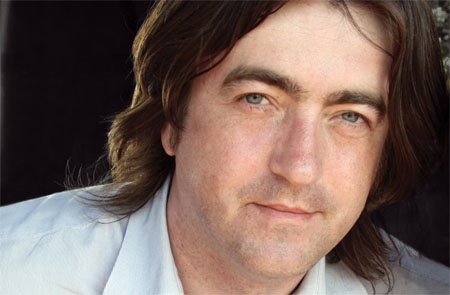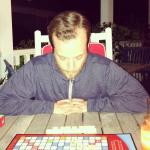Steven Sheil Talks "Mum & Dad"
Landing this week on US shores, Steven Sheil's "Mum & Dad", the latest dark horror film to come out of Europe. He sat down with us recently to talk about the film and its controversial subject matter, and here's what happened.
I think that there’s a lot of talk in the UK about family and parenting and a lot of worries about ‘Broken Britain’ – this idea that society is collapsing.
Are you a big horror fan? What films would you say influenced it the most?
I watch a lot of horror films and I especially love Italian horror and giallos (Argento, Bava, Aldo Lado) and grim and sleazy British stuff from the Seventies. For "Mum & Dad" it was more the British stuff – Pete Walker’s "‘Frightmare" and "House of Whipcord", Freddie Francis’ "Mumsy, Nanny, Sonny and Girlie" - that influenced me, alongside other films like the Japanese "Blind Beast" and the Belgian film "Calvaire". I just wanted to make a sick, strange little film.
Being from the UK, you must have been growing up right in the midst of the "Video Nasties" craze. Can you describe what it was like being a horror fan at that time?
I was at quite a formative age during the whole ‘Video Nasties’ era, so for me it was pretty exciting – you got a real sense that horror films were dangerous and toxic and that they could really corrupt you – which was both frightening and attractive at the same time. It was also the era of the VHS tape – ropey picture quality, lines on the screen, dodgy pirate copies with terrible dubbing – which was a great artefact – somehow watching things on tape made them seem even grubbier. I think horror is great when it feels a bit underground, a bit like it’s bubbled up from some dark mass subconscious, and the Video Nasty era really had that feel.
You mention that the inspiration for the film was the "twisted family" films coming out of the US, but that there wasn't a lot of that historically in the UK. Do you think all of the news about child/teen violence in the UK in the last few years may change that trend? Was that present in your mind while writing the film?
I think that there’s a lot of talk in the UK about family and parenting and a lot of worries about ‘Broken Britain’ – this idea that society is collapsing because we don’t have any ‘family values’ any more. That definitely fed into the script – I wanted to explore the idea of a family that was very strict and disciplinarian, where the kids are on a very short leash - almost the opposite of the so-called feral kids that are often demonized in the British press – but where the parents were brutal perverts.
I think there are probably going to be more films with similar subjects – I guess we’ve had "Eden Lake" and "The Children" recently – because there is such a lot of talk about about the family in the UK. Also, thematically it’s quite rich territory – parent/child relationships are very complex and changeable and filled with great dynamics to explore as a writer.
How difficult was it to film something as bizarre and intense as the kitchen sequence towards the front end of the feature?
The breakfast scene in the kitchen near the start of the film was the first thing we shot – day one of the production. We wanted to begin with something that was going to be a challenge, something big, just so that we could set the tone for the film – both in terms of what was going on screen and in terms of how we were going to work as a crew. It was important to me to do something that got all of the primary cast working together and where I could see them all interacting.
Practically speaking, it wasn’t too hard to shoot. The kitchen was small and cramped – everything was shot on location in a number of houses in Nottingham – which forced our hands a little bit with how we shot it, but I really wanted the scene to allow the actors to do their work. It’s quite a key moment in the film, because it’s the first time that we see how the horror and perversion of the house bleeds into the domesticity. We’re in Lena’s shoes, battered, bruised and shell-shocked, thinking ‘What the fuck is going on? Why are these people acting like this is normal?’. It’s where you begin to see how messed-up Mum and Dad really are. It was a great scene to get done so early on, because it set the tone and it made me believe that I was going to be able to make the film work.
How did the cast and crew respond the picture's high level of violence? Were there any scenes that people were uncomfortable shooting?
I’ve got to say that everyone involved in the film was great – it’s kind of weird, writing all of this twisted stuff down, then asking people to make it real. There was a moment early on in the shoot where I was sat looking at the monitor during a take, watching two young women wrestling on a dirty kitchen floor, yelling and clawing at each other, where I really felt self-conscious – like, why have I contrived to make this happen? – but then I looked around at all the crew who were standing around watching with me and none of them seemed to find it weird so I thought ‘what the hell’ and just carried on.
I tried to make the shoot good fun for the cast and crew – I think it’s important when you’re dealing with quite grim stuff that you allow people to feel comfortable. There were a few moments that I know stretched the actors - especially in the early torture scenes which were quite draining for everyone to shoot – but I think everyone went into the film with their eyes open, and luckily they all seemed to trust me that I wasn’t going to ruin their careers…

My Mum always asks me to make sure and tell people it’s not autobiographical.
When filming the film's bevy of torture sequences, how did you prepare the actors beforehand?
We didn’t have a lot of time to rehearse before the film, and I didn’t get a great amount of time with the actors on set – we shot really quickly, over 17 days, so there wasn’t much of an opportunity to take time out – but I tried to make sure that the actors had a good idea of the mindset of the characters at all times. The idea that this was a family – with rules and beliefs and strongly developed relationships – really helped with that. Also, we always tried to make the experience as comfortable as possible for the actors, so that when they were doing the really tricky stuff they felt supported and safe.
How do you respond to critics who criticize the film for its extreme nature?
I think horror films should be horrifying – that’s their job. They should push boundaries and touch raw nerves and try and get under people’s skin. Some people like to have that experience with a horror film and some don’t, and I understand that. But I don’t think that people should criticise the film for doing what it’s supposed to do. Besides, for a lot of people the film isn’t so extreme, especially in terms of gore. I think a lot of people have strong reactions to the film because of the themes – there’s something about the perversion of family relationships that really gets to people.
Have your parents seen it? What was their reaction given it's about a family unit?
My parents watched it a couple of months ago, when it came out on DVD in the UK. Neither of them are horror film fans, so I had warned them beforehand, but they were interested to see what I’d been up to. They tell me they liked it – but my Mum always asks me to make sure and tell people it’s not autobiographical. They watch a lot of crime stuff on TV – things like CSI – so they’re used to a certain amount of blood and bodies and I think we probably share a similar sense of humour, because they seemed to find the family stuff – and the Christmas scene in particular – really funny.
Is the ultimate goal to move to Hollywood, or would you prefer to stay in the UK film scene?
My goal is to carry on making films wherever I can. I’m writing scripts set in the UK, in Europe and in the US, so I just need to see what works out. I just want to carry on working and making films.
A lot of European horror directors who find success seem to be offered remakes of US films. Would that be something you'd entertain if offered?
If it was a project that I thought I could bring something to, then, yeah, why not? Although it’s hard to think of what hasn’t already been remade or is being lined up – I think all of the big hits of the Seventies and Eighties have already been done, so now maybe they need to go onto the lesser-known stuff, which could be more interesting.
What's up next for you? Is there more horror in your future?
I’m just finishing a new script, another horror called "Empire of Flesh". After that, maybe a sci-fi film. I like working in genre cinema, so I think horror will always be there for me, even if it’s not in every film that I make. I know I’ve got another few horror stories I want to get out of my system.

